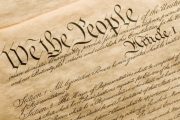Twenty-four percent (24%) of American adults believe states have the right to secede from the union and form an independent country, according to a recent survey conducted by polling professionals Rasmussen Reports.
In its telephone survey of 1,000 American adults conducted May 29-30, Rasmussen pollsters asked respondents the following question: “Do individual states have the right to leave the United States and form an independent country?”
The percentage of those answering yes to that question has increased by 10 percent in the two years since the same question was asked in a previous poll.
In a statement released concurrent with the publication of the poll results, Scott Rasmussen (founder and president of Rasmussen Reports) said that the surprising responses indicated that Americans have “serious and growing concern about the federal government.”
That such a sentiment has grown so popular is to be expected given the decline in economic prosperity and the increase of the authoritarian surveillance state. Americans daily witness the usurpation of power by a never-surfeited federal government. State sovereignty is spoken of only in context of a now extinct notion of federalism, a relic from our republican past.
In a statement made to CNSNews.com, Rasmussen also alluded to the burgeoning frustration with the federal government as a reason for the results.
“We do see that people are concerned about the federal government in a variety of ways. Fifty-one percent believe that it’s a threat to individual liberties.”
“It may just be part of a growing frustration with other aspects of the federal government,” he continued. “But I think it’s important to keep it in perspective, growing to 24 percent still means that only one out of four Americans think that states have the right to secede, it’s not that they’re advocating for it,” he clarified.
Not everyone thinks that fracturing the union is the solution to the problem of runaway government, however. In the survey cited above, 59 percent of those participating in the poll said they don’t believe that secession is a right possessed by the states, with 16 percent remaining undecided on the issue.
In a similar survey conducted in 2008 by the Rasmussen rival organization, Zogby, 22 percent of those questioned said that they believed that any state or group of states has the right to “peaceably secede from the United States and become an independent republic.”
When asked to opine as to whether they thought a state would likely seek secession as remedy within the next 25 years, 10 percent of those polled by Rasmussen answered in the affirmative. This prompted Rasmussen to claim that “it’s [secession] not seen as a very realistic possibility.”
As if there was any doubt what has convinced such a significant number of Americans that they’d be better off leaving the United States, Rasmussen Reports probed further into the source of the disaffection.
“Just over half (51%) of Americans continue to believe that the government is more of a threat to individual rights than a protector of them,” the survey results indicate. Further evidence of the erosion of trust in government was found in the fact that “only 34% of adults in this country regard the federal government more as a protector of individual rights.”
Certainly there is some bias in the formulation of the questions, but the results do inspire further inquiry into the opinions expressed.
First, was the federal government created to “protect individual rights?” Certainly not. The Founders nearly to a man regarded the federal government as a threat to liberty and thought that it was at best a necessary evil. As James Madison said in Federalist no. 51, “If men were angels, no government would be necessary.” Men are not angels so government was established with its principal purpose being “the protection of … property.”
Perhaps therein is found the root of the growing tree of resistance to federal authority. From local police using a federally owned drone to track down a man on his own farm (without first obtaining a warrant for that sort of surveillance) to the Environmental Protection Agency preventing a couple from building their dream home because it (erroneously) insisted that their .63-acre lot was a federally protected wetland, Americans are weary of the constant assault on their rights by a seemingly never-ending barrage of federal acts and regulations, most of which have no constitutional provenance.
Between those acts of the legislative branch and the regulations promulgated by the sprawling branches of the executive department, due process is being run out of town on a rail, and those holding individual liberty dear are being forced to find a new, more hospitable climate in which to live.
As Scott Rasmussen was quoted in the CNSNews.com report: “What we’re seeing in a whole range of surveys is serious and growing concern about the federal government, about the role of government in American life,” he said. “Only about one out of five Americans believe the government today has the consent of the governed. People believe that America’s best days — about half the nation believes — America’s best days have come and gone.”
Is the glory of the American Republic now gone? Has the glow of the shining city on a hill been dimmed by the shade of empire? These Rasmussen and Zogby poll results seem to point toward the realization by many citizens that the benefits of a republic are non-existent in an empire bent on bringing larger and larger swaths of global territory under its control. The size of the scope of American liberty is inversely proportional to the size of the emerging American Empire.
As James Madison wisely warned in 1795:
Of all the enemies to public liberty war is, perhaps, the most to be dreaded, because it comprises and develops the germ of every other. War is the parent of armies; from these proceed debts and taxes; and armies, and debts, and taxes are the known instruments for bringing the many under the domination of the few. In war, too, the discretionary power of the Executive is extended; its influence in dealing out offices, honors, and emoluments is multiplied; and all the means of seducing the minds, are added to those of subduing the force, of the people. The same malignant aspect in republicanism may be traced in the inequality of fortunes, and the opportunities of fraud, growing out of a state of war, and in the degeneracy of manners and of morals engendered by both. No nation could preserve its freedom in the midst of continual warfare.
Those elected to lead the United States annually vote to perpetuate the various foreign conflicts begun in the name of protecting national security, sacrificing our blood and treasure on the altar of globalism.
Whether Republican or Democrat, hundreds of these elected representatives repeatedly ignore their oaths of office and disregard the Constitution and the enumerated powers contained therein that were designed to prevent the rise of tyranny in this blessed country.
Ironically, these poll numbers that seem to portend the centrifugal dissolution of the American union may be evidence of an impending restoration of the principles of freedom and federalism that for many years kept this nation from following the path of absolutism trod by nearly all of the republics of history.
We must remember, and force Washington to recognize, that states still possess the power to resist federal despotism. The 10th Amendment makes it clear that the Constitution has endowed the federal government with very limited authority and that the states retain any and all power not specifically placed within the federal sphere.
Secession becomes nearly unnecessary when state legislatures nullify each and every congressional act or presidential decree that violates the terms stipulated in the Constitution. This attitude preserves the union, as well as demonstrates our fealty thereto (and by extension to the Founding Fathers). Nullification is less radical than secession as it is an ad hoc approach that preserves and proclaims the sovereignty of the states without dissolving their union.
That is to say, the states, as parties to the compact that created the central government, have a natural right to resist the federal government’s usurpation of powers not specifically granted to it by the Constitution. For too long Congresses, Presidents, judges, and bureaucrats have “worshipped and served the creature more than the creator” (Romans 1:25). It is time that the creators of the government assert their preeminence and restore the balance of power established by them in the Constitution.




